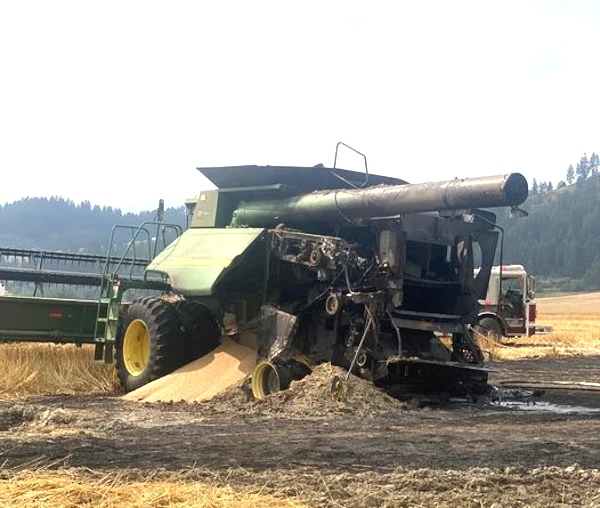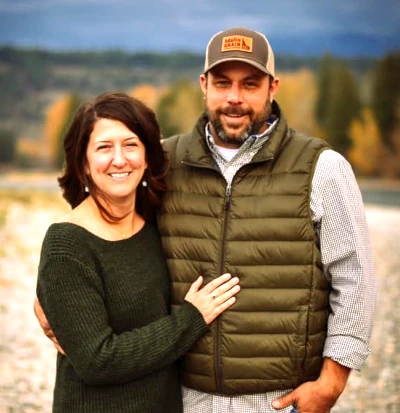By Mike Weland
 Ty and Lisa Iverson, Bonners Ferry, experienced a farm family’s nightmare Monday when one of their combines caught fire and burned while harvesting grain in one of their fields, costing them a valuable piece of equipment and the potentially even more precious commodity of time. And while devastated, their first inclination was graciousness.
Ty and Lisa Iverson, Bonners Ferry, experienced a farm family’s nightmare Monday when one of their combines caught fire and burned while harvesting grain in one of their fields, costing them a valuable piece of equipment and the potentially even more precious commodity of time. And while devastated, their first inclination was graciousness.
“Today was a hard day as we watched one of our combines catch fire—a truly devastating experience,” Lisa posted to Facebook. Not only is Lisa putting in long hours helping bring in the season’s crop, as principal of Bonners Ferry High School she’s busy making preparations to welcome students back to school, opening day being September 3, just three weeks away.
“However,” she continued, “in the midst of this loss, we are profoundly grateful that everyone is safe and unharmed. While no farmer ever wants to face the expense of replacing vital equipment, especially during harvest, nothing is more irreplaceable than the hardworking individuals who dedicate themselves every day to keeping the farm running.

“We want to express our deepest gratitude to the harvest crew, all the fire and EMS agencies, law enforcement, and our neighbors in Boundary County for their quick response. Your swift actions made all the difference, and we are immensely thankful for our community.”
A farmer works all hours year around, no Fair Labor Standards Act 40-hour work week or overtime for them, and they don’t get paid until their crop is in.
They get paid not by the hour, but by the bushel. And when harvest time hits, determined by the moisture content of the grain, there’s a very narrow window of time before this year’s crop turns into “volunteers” that will fall to the ground and spring up as next year’s weeds.
And then there’s the weather … every hour the ripened crop is in the field it is in danger … from rain, from wind, from hail … from fire. A modern combine can glean 150 acres of grain — wheat, rye, barley, oats — a day. For reference, that’s 43,560 12-inch by 12-inch floor tiles.
It takes a special breed to be a farmer, and the graciousness show by Lisa is a trait not uncommon on the family farm.
She and Ty have a slight advantage, though. Ty grew up following his dad, Tom, on the family farm, and he got to see more of his mom when he became a freshman at Bonners Ferry High School, where she devoted a career to teaching.
I have written before of children carrying on the family tradition, of generations staying on to work the family farm (sadly a rarity these days), of children entering and pursuing a profession thanks to the inspiration of a parent. Until now, I don’t think I’ve written anything in which both fit the same story.
And while it pains me to write of the hardship Ty and Lisa must now face, I must confess I’m not surprised they face the crisis with such steadfast aplomb, such strength and dignity. The footsteps they chose to follow could lead them down no other path.
